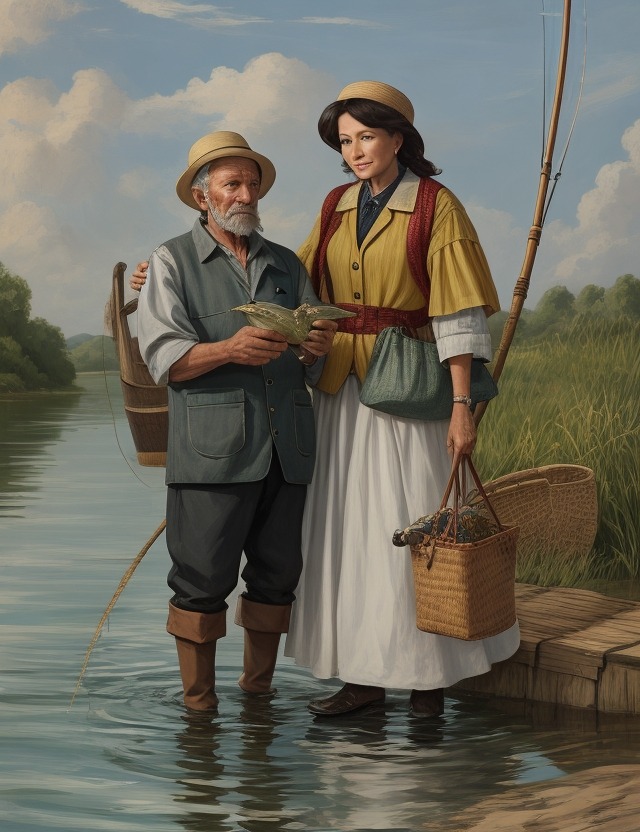Once upon a time, in a realm teeming with captivating folklore, there existed a timeless fairy tale known as The Fisherman and His Wife. Penned by the enigmatic writer Brothers Grimm whose words continue to captivate readers even centuries later, this fable weaves a tapestry of profound wisdom and cautionary lessons.
- The Fisherman and His Wife Short Story Summary
- The Fisherman and His Wife Setting
- The Fisherman and His Wife Moral Lesson
- The Fisherman and His Wife Analysis
- The Fisherman and His Wife: Key Themes
- The Fisherman and His Wife: Characters
- The Fisherman and His Wife: Symbols
- The Fisherman and His Wife: Culture Impact
- The Fisherman and his Wife Questions and Answers
As we embark on a journey through the pages of this timeless piece of literature, let us unravel the secrets hidden within its narrative, discover the power of ambition, and reflect upon the consequences of insatiable desires. Brace yourself for a spellbinding adventure that will transport you to an era of magical realism, where a humble fisherman’s encounter with a mystical creature forever alters the course of his life. Intriguing, poignant, and thought-provoking, join us as we delve into this captivating summary of ‘The Fisherman and His Wife,’ a literary masterpiece that continues to resonate with readers of all ages.
The Fisherman and His Wife Short Story Summary
The Fisherman and His Wife is a classic fairy tale by the Brothers Grimm. The story is about a poor fisherman who catches a fish that claims to be able to grant wishes. The fisherman kindly releases the fish, but his wife insists that he go back and ask the fish to grant her wish for a nice house. The fisherman reluctantly returns to the shore and summons the fish, which grants the wife’s wish. The wife’s desire grows, and she demands more and more, including that her husband be made a king. Each time, the fisherman returns to the shore and asks the fish for more. But each time, the sea grows rougher and rougher. Eventually, the wife wishes to become equal to God. The fisherman makes this last, fateful wish, and the fish grants it. The sea becomes calm once more, and the fisherman and his wife are once more living in their old, dirty hovel. The moral of the story is that greed can lead to loss.
The Fisherman and His Wife Setting
The Fisherman and His Wife is set in a hovel by the sea. The fisherman and his wife live in poverty, and the fisherman catches a fish that claims to be able to grant wishes. The story takes place on the shore, where the fisherman summons the fish to grant his wife’s wishes.
The Fisherman and His Wife Moral Lesson
The moral lesson of The Fisherman and His Wife is that greed can lead to loss. The fisherman’s wife is never satisfied and constantly wants more. Each time, the fisherman returns to the shore and asks the fish for more, but each time, the sea grows rougher and rougher. The story teaches us that we should be content with what we have and not let greed consume us.
The Fisherman and His Wife Analysis
The Fisherman and His Wife is a tale that teaches us about moderation, greed, and that the magnitude of material objects one accumulates does not measure happiness. The wife is never satisfied and constantly wants more, while the fisherman is content with what he has. The story emphasizes that we should be content with what we have and not let greed consume us.
The Fisherman and His Wife: Key Themes
The Fisherman and His Wife is a well-known German fairy tale collected by the Brothers Grimm. It tells the story of a poor fisherman who catches a magical fish that grants wishes. However, the fisherman and his wife’s insatiable desires ultimately lead to their downfall.
1. The theme of greed and materialism: One of the central themes in “The Fisherman and His Wife” is the destructive nature of greed and materialism. The fisherman’s wife is never satisfied with the wishes granted by the magic fish and constantly demands more. She uses the magic fish to gain wealth, power, and even the ability to become a god. However, each wish only makes her more dissatisfied and hungry for more. This theme warns against the dangers of excessive desires and the emptiness of material gains.
2. The theme of the consequences of greed: Another important theme in the story is the idea that unchecked greed comes with severe consequences. Throughout the tale, the fisherman warns his wife that their pursuit of endless wishes will only lead to disaster. However, she disregards his concerns and continues to demand more. As a result, each wish leads to a decline in their social standing, until they eventually lose everything they had gained. This theme teaches the moral lesson that greed and an inability to be content can have dire consequences.
3. The theme of contentment and gratitude: On the other hand, “The Fisherman and His Wife” also explores the importance of being content with what one has and expressing gratitude. The fisherman, despite his poverty, is satisfied with his modest lifestyle and appreciates what he catches. He understands that there is value in being thankful for the small blessings in life. This serves as a contrast to his wife’s insatiable greed. The theme of contentment and gratitude suggests that true happiness and fulfillment can be found by appreciating the present moment and being grateful for what one already has.
The Fisherman and His Wife: Characters
- The Fisherman: A weathered and humble man with salt-and-pepper hair, the Fisherman spends his days patiently casting his net into the sea. Despite his simple life, he possesses a heart full of kindness and a soul that carries the weight of the world. His nimble fingers expertly handle the fishing gear, as if they were an extension of his being. Although viewed by others as an ordinary fisherman, he possesses an extraordinary ability to recognize the beauty and value of what he already possesses.
- The Fisherman’s Wife: A woman of extravagant desires and an insatiable hunger for more, the Fisherman’s wife is known for her golden curls and striking emerald eyes. With an air of entitlement, she spends her days striving to obtain more wealth and power. Yet, no matter how many wishes she receives, her greed is never satiated. Her lust for more starts out as a comedic quirk but evolves into an exploration of the human condition, reminding readers of the dangers of avarice and teaching us that true happiness is often found in the simple things.
- The Talking Fish: A rare and magical creature, the Talking Fish is a sight to behold. As it gracefully glides through the crystal clear waters, its shimmering silver scales catch the sunlight like tiny diamonds. With eyes that hold the wisdom of the ages, it possesses the power of granting wishes to those who spare its life. The Fish’s enchanting voice bewitches all who hear it, leaving them captivated and desiring more. As the catalyst for the Fisherman and his Wife’s journey, the Talking Fish’s character develops a subtle commentary on the nature of power and the consequences of granting unchecked desires.
- The Wise Old Sea Witch: The Wise Old Sea Witch is a mysterious figure who dwells deep in the heart of the sea. With flowing robes that seem to dance to their own rhythm and ancient runes carved into her skin, she is a living embodiment of the wisdom of the oceans. She plays a pivotal role in the story as the guiding force who warns the Fisherman and his Wife of the dangers of their insatiable desires. Despite her immense knowledge, she remains shrouded in an air of enigma, only appearing when sought after by those truly in need.
- The Sea: The Sea, a vibrant and ever-changing character, serves as both a stage and a backdrop for the unfolding drama. Its azure waves crash against the shore, whispering secrets and stories of the past. Its temperamental moods reflect the emotional journey of the characters, raging and calm in tandem with their various triumphs and setbacks. The Sea reminds us of the infinite capabilities of nature and its ability to shape our destinies.
- The Landlord: A boisterous and fumbling character, the Landlord is a jovial man with an ample belly and a twinkle in his eye. As the owner of the Fisherman’s small cottage, he constantly pesters the Fisherman with demands for rent. Unaware of the profound changes occurring in the Fisherman’s life, he represents the conventional expectations of societal norms, contrasting with the Fisherman’s chosen path of simplicity and contentment.
- The Neighbors: A colorful ensemble of chatterboxes and gossip mongers, the Neighbors are a lively group that adds humor and authenticity to the story. From their intriguing fashion choices to their outlandish stories, they reflect the eccentricities and idiosyncrasies of everyday people. Though they serve as a background chorus, their antics provide a contrasting lightness to the mirroring struggles faced by the Fisherman and his Wife.
The Fisherman and His Wife: Symbols
1) The Fish: The fish is the most central symbol in the story, as it represents the source of the couple’s desire and power. When the fisherman catches the magical fish and it grants the wife’s wishes, it highlights the transformative power a humble creature can hold. The fish reflects the theme of the unpredictable and fleeting nature of desire. As the story progresses, the fish itself becomes a symbol of gluttony and greed, as the wife’s endless desires lead to her downfall.
2) The Sea: The sea in the story serves as a symbol of both opportunity and consequence. It represents the vastness and endless possibilities the couple encounters when they stumble upon the magical fish. Through the sea, the story explores the themes of ambition, power, and the cyclical nature of life. It also symbolizes the unpredictability of the world and the consequences that come with unchecked desires. The sea’s changing moods reflect the ups and downs in the couple’s fortunes, emphasizing the idea that one must navigate the sea of life with humility and gratitude.
3) The Cottage: The cottage serves as a symbol of comfort and contentment, contrasting with the insatiable desires of the wife. From the couple’s initial humble dwelling to the opulent castle and then back to their humble cottage, the changing settings symbolize the fickleness and transient nature of material possessions. The cottage represents a simpler and more peaceful life, where the couple could have found happiness if they had been content with what they had. It symbolizes the importance of appreciating and cherishing what one possesses rather than constantly seeking more.
The Fisherman and His Wife: Culture Impact
The Fisherman and His Wife is a timeless fairytale written by the Brothers Grimm, first published in 1812. Since its inception, this enchanting story has left an indelible impact on culture across generations, garnering immense popularity and becoming an integral part of world folklore.
Historically, this book played a significant role in preserving oral traditions and folktales, which were gradually fading away during the 19th century. The stories collected by the Brothers Grimm, including “The Fisherman and His Wife,” not only provided entertainment but also served as a cultural treasure trove, offering profound insights into German folklore and captivating audiences worldwide.
The impact of “The Fisherman and His Wife” on culture can be observed in various ways. Firstly, it revolutionized children’s literature by introducing key components of the fairytale genre, including magical elements, moral lessons, and archetypal characters. This book inspired countless subsequent fairytales and animated adaptations, igniting the imaginations of children and adults alike. From Disney’s “The Little Mermaid” to contemporary retellings, the concept of a humble protagonist seeking wishes has become a beloved trope in popular culture.
Interestingly, the story’s moral ambiguity has also contributed to its cultural impact. On one hand, it reveals the consequences of greed and materialistic desires, cautioning against the pitfalls that unbridled ambition can lead to. On the other hand, it sparks conversations around the ethical dilemmas of wish fulfillment and the value of contentment. These timeless themes have resonated with readers and sparked debates about human nature, morality, and the pursuit of happiness.
Moreover, “The Fisherman and His Wife” has often been adapted and performed in various creative spaces, spreading its influence beyond the realm of literature. Whether in theater, puppetry, or even opera, this tale’s enduring popularity has inspired countless artists, writers, and playwrights to explore its themes of desire, transformation, and the human condition. Its adaptability and versatility have helped keep this story alive through the ages.
Additionally, the humorous elements of the book have contributed to its cultural impact. The interactions between the fisherman, his demanding wife, and the magical fish they encounter are often laced with comedic undertones. These moments of levity have helped the story transcend boundaries, appealing to readers of all ages and cultures, while providing a much-needed respite from the realities of life.
Overall, “The Fisherman and His Wife” continues to be celebrated for its influential role in shaping cultural narratives surrounding fairytales, morality, and the pursuit of happiness. Through its historic preservation of German folklore, its humorous and relatable characters, and its thought-provoking moral lessons, this book has firmly entrenched itself in the tapestry of global folklore, leaving an enduring impact on popular culture for generations to come.










